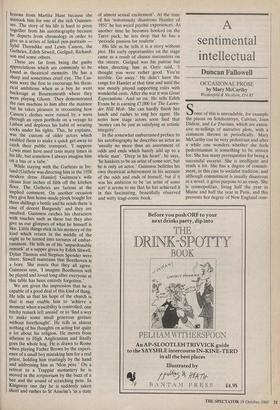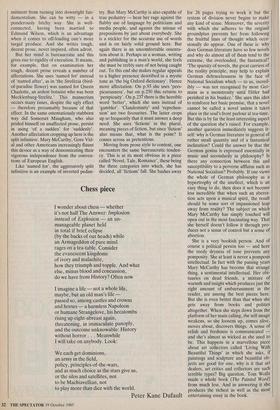A sentimental intellectual
Duncan Fallowell
OCCASIONAL PROSE by Mary McCarthy
Weidenfeld & Nicolson, £14.95
Some of this is unreadable, for example the pieces on Solzhenitsyn, Calvino, Joan Didion, and La Traviata, which are exten- sive re-tellings of narrative plots, with a comment thrown in periodically. Mary McCarthy can be very pedestrian and after a while one wonders whether she feels pedestrianism is something to be striven for. She has many prerequisites for being a successful essayist. She is intelligent and reads a lot. She has a degree of commit- ment, in this case to socialist tradition, and although commitment is usually disastrous in a novel, it gives purpose to an essay. She is cosmopolitan, living half the year in Maine and half the year in Paris, and this prevents her degree of New England corn- mitment from turning into downright fun- damentalism. She can be witty — in a ponderously bitchy way. She is well- connected, having been married to Edmund Wilson, which is an advantage when it comes to off-loading one's more turgid produce. And she writes tough, decent prose, never inspired, often adroit.
But her mind is bureaucratic and this gives rise to rigidity of execution. It means, for example, that on examination her tough, decent prose reveals a number of affectations. She uses `named for' instead of 'named after', as in 'the Strelitzia (bird- of-paradise flower) was named for Queen Charlotte, an ardent botanist who was born Mecklenburg-Strelitz.' This mannerism occurs many times, despite the ugly effect — therefore presumably because of that effect. In the same ostentatiously stubborn way did Somerset Maugham, who also prided himself on unaffected prose, persist in using 'of a sudden' for 'suddenly'. Another affectation cropping up here is the split infinitive. Mary McCarthy, Gore Vid- al and other Americans increasingly flaunt this device as a way of demonstrating their vigorous independence from the conven- tions of European English.
Like 'named for', the aggressively split infinitive is an example of inverted pedan- try. But Mary McCarthy is also capable of true pedantry — hear her rage against the flabby use of language by politicians and media people, and against the misuse of prepositions by just about everybody. She is a stickler for the accurate use of words and is on fairly solid ground here. But again there is an uncomfortable ostenta- tion about it. Perhaps as a woman, writing and publishing in a man's world, she feels she must be trebly sure of not being caught out. To this end she makes regular appeals to a higher presence described in a mystic tone as 'the big Oxford dictionary'. Hence more affectation. On p.93 she uses 'pers- picuousness', but on p.250 this returns to `perspicuity'. On p.237 there is the horrible word 'better', which she uses instead of `gambler'. 'Clandestinity' and 'reprehen- sion' are two favourites. The latter crops up so frequently that it must answer a deep need. She uses 'fictions' in the plural, meaning pieces of fiction, but since 'fiction' also means that, what is the point? It comes across as pretentious.
Moving from prose style to content, one encounters the same bureaucratic tenden- cy. This is at its most obvious in a piece called 'Novel, Tale, Romance', these being the three categories into which, she has decided, all 'fictions' fall. She bashes away for 26 pages trying to work it but the system of division never begins to make any kind of sense. Moreover, the severity with which she adheres to the original groundplan prevents her from following the fruitful lines of thought which occa- sionally do appear. One of these is: why does German literature have so few novels and why do almost all of them tend to the extreme, the overloaded, the fantastical? `The sparsity of novels, the great carriers of the reality principle, may help to explain German defencelessness in the face of National Socialism which — to us, incred- ibly — was not recognised by most Ger- mans as a monstrosity until Hitler had perished in his bunker.' She uses this idea to reinforce her basic premise, that a novel cannot be called a novel unless it takes place in the soul's front parlour at tea-time. But this is by far the least interesting aspect of the question she's raised. For example, another question immediately suggests it- self: why is German literature in general of rather small quantity and of a fantastical inclination? Could the answer be that the German genius is expressed essentially in music and secondarily in philosophy? Is there any connection between this and susceptibility to a perverse afflatus such as National Socialism? Probably. If one views the whole of German philosophy as a hypertrophy of the intellect, which is an easy thing to do, then does it not become less incredible that when such an aberra- tion acts upon a musical spirit, the result should be some sort of impassioned leap away from reality? The subject on which Mary McCarthy has simply touched will open out in the most fascinating way. That she herself doesn't follow it through pro- duces not a sense of control but a sense of abortion.
She is a very bookish person. And of course a political person too — and here the reedy dryness of tone prevents any pomposity. She at least is never a pompous intellectual. In fact with the passing years Mary McCarthy has become that strange thing, a sentimental intellectual. Her obi- tuaries on dead friends, a mixture of warmth and insight which produces just the right amount of embarrassment in the reader, are among the best pieces here. But she is even better than that when she gets away from books and politics altogether. When she steps down from the platform of her main calling, the self-image weakens, so she loosens up, comes alive, moves about, discovers things. A sense of relish and freshness is communicated — and she's almost as wicked as she used to be. This happens in a marvellous piece about art collectors called 'Living With Beautiful Things' in which she asks, if paintings and sculpture and beautiful ob- jects are good for one, why is it that art dealers, art critics and collectors are such terrible types? Big question. Tom Wolfe made a whole book (The Painted Word) from much less. And in answering it she produces the richest as well as the most entertaining essay in the book.



















































 Previous page
Previous page